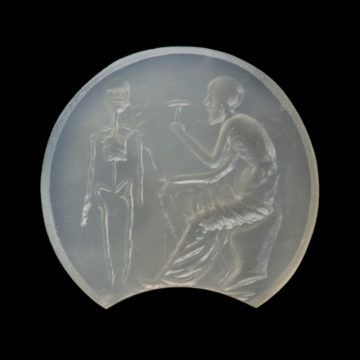Adrienne Mayor in Lapham’s Quarterly:
 How long have we been imagining artificial life? A remarkable set of ancient Greek myths and art shows that more than 2,500 years ago, people envisioned how one might fabricate automatons and self-moving devices, long before the technology existed. Essentially some of the earliest-ever science fictions, these myths imagined making life through what could be called biotechne, from the Greek words for life (bio) and craft (techne). Stories about the bronze automaton Talos, the artificial woman Pandora, and other animated beings allowed people of antiquity to ponder what awesome results might be achieved if only one possessed divine craftsmanship. One of the most compelling examples of an ancient biotechne myth is Prometheus’ construction of the first humans.
How long have we been imagining artificial life? A remarkable set of ancient Greek myths and art shows that more than 2,500 years ago, people envisioned how one might fabricate automatons and self-moving devices, long before the technology existed. Essentially some of the earliest-ever science fictions, these myths imagined making life through what could be called biotechne, from the Greek words for life (bio) and craft (techne). Stories about the bronze automaton Talos, the artificial woman Pandora, and other animated beings allowed people of antiquity to ponder what awesome results might be achieved if only one possessed divine craftsmanship. One of the most compelling examples of an ancient biotechne myth is Prometheus’ construction of the first humans.
Prometheus was first introduced in Hesiod’s poems, written between 750 and 650 bc, and about two dozen Greek and Latin writers retold and embellished his story. From earliest times Prometheus was seen as the benefactor of primitive humankind. One familiar rendering of the Prometheus myth was featured in the Athenian tragedy Prometheus Bound, attributed to Aeschylus, circa 460 bc. The play opens with the blacksmith god Hephaestus reluctantly chaining Prometheus to a rock at the end of the world. The chorus asks Prometheus why he is being punished. “I gave humans hope,” he replies, “so they may be optimistic, and taught them the secrets of fire, from which they may learn many crafts and arts (technai).”
But fire was the sacred possession of the immortals, and Zeus, the tyrannical king of the gods, took harsh revenge on Prometheus for stealing fire for the benefit of mere mortals, sending an eagle to gnaw eternally at his liver. The technology of fire gave humans some autonomy from their divine creators—now they could invent language, plan cooperatively, make tools, protect themselves from the elements and from each other, and increasingly manipulate the world around them according to their own desires. In time Prometheus’ gifts were expanded to include writing, mathematics, medicine, agriculture, domestication of animals, mining, science—in other words, all the arts of civilization. We might say that by giving men and women this basic technology, Prometheus opened the door for humans—themselves products of divine biotechne—to begin engaging in their own biotechne.
By the fifth century bc, the Athenians were venerating the rebel Prometheus and his precious gifts of fire and technology alongside the city’s favorite gods, Athena and Hephaestus.
More here.
